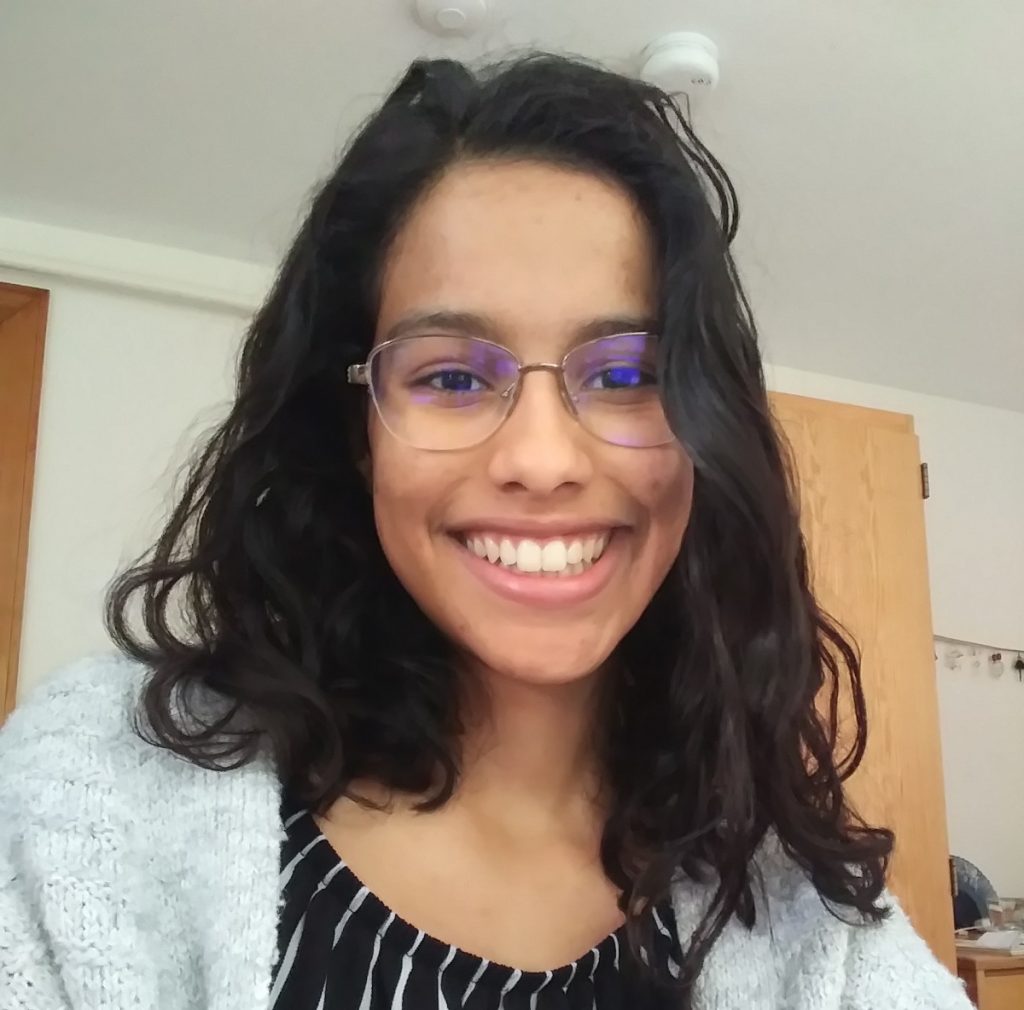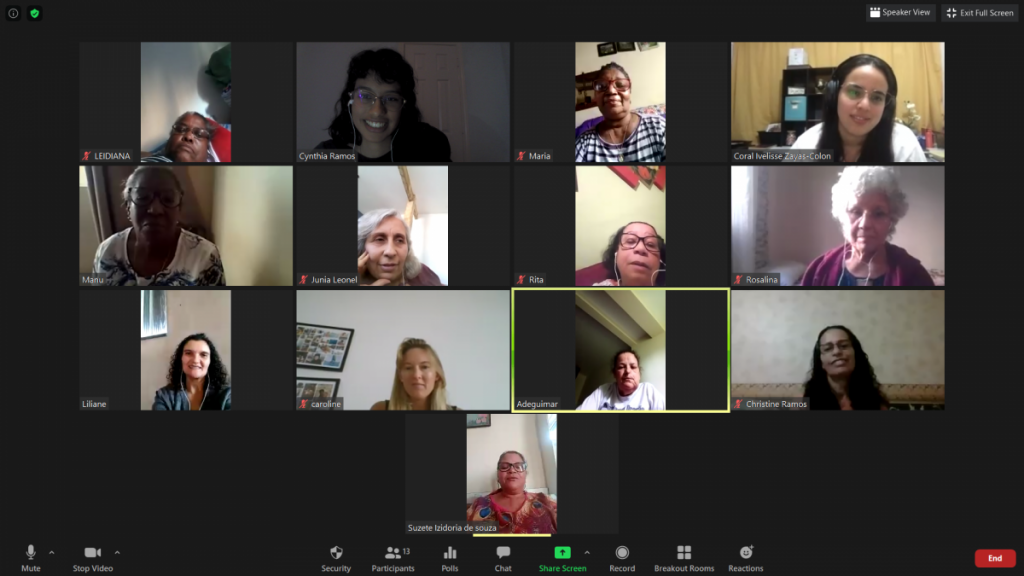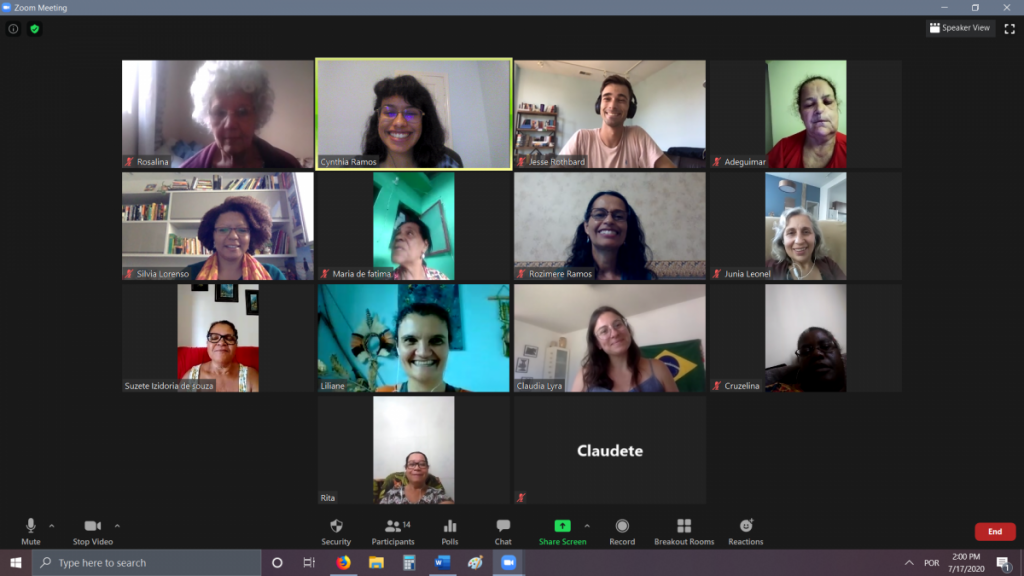Read this article to learn more about Cynthia Ramos’s ’21 experiences bringing together members of Entre Elas, a women’s theatre group in Belo Horizonte, Brazil, and students in Middlebury’s Portuguese Language School, as one the CCE’s three language immersive interns this summer.
This summer, the CCE supported a cohort of language immersive student interns to coordinate and facilitate community-engaged co-curricular projects for students in Middlebury’s Korean, Portuguese, and German Language Schools.
One of those interns, Cynthia Ramos ‘21, facilitated weekly conversation and intercultural exchange between students in the Portuguese language school and the members of Entre Elas, a community theatre group of 15 elderly women in Belo Horizonte, Brazil.
Cynthia has multiple connections to the city of Belo Horizonte, making this project especially impactful for her. Belo Horizonte is the city her parents grew up in. She chose to study abroad in Belo Horizonte this past spring to learn more about their culture and her heritage, but was only there for a month and a half before the experience was cut short due to COVID-19.

This internship has provided Cynthia, the Portuguese students, and especially the Entre Elas women with valuable social interactions this summer. In Cynthia’s words:
“These women were really active members of their community before the pandemic broke out, performing in various cities, and now they’re confined to their houses. So not only is there an intercultural exchange happening, but students have helped keep this community from falling apart during the pandemic—the Entre Elas members wouldn’t have come on Zoom if it wasn’t for them. We were able to build community online, bring it to their doorstep—a safe way to keep them mentally and emotionally strong.”
Like all community building, especially that occurring across cultural, linguistic, and generational barriers, the process has been at times difficult and messy. In her weekly written reflections, Cynthia chronicles the difficulties of bringing diverse communities together through Zoom, being a key member of a pilot program, and keeping herself accountable remotely.

She describes one disheartening incident where her Internet service kept failing, leading to a 30-minute delay in the discussion start time. “It was a huge waste of time,” she laments, “Because I was still flustered from my Internet not working, I messed up the [Zoom] breakout rooms the first time I created them as well.”
Apart from technical difficulties and Internet access issues, Zoom presents a host of other challenges, which Cynthia describes eloquently:
“Working remotely makes you hyper-aware of your own appearance and presence. With your camera on, you may find yourself examining your own expressions as you talk, a process that is unconscious, but tiring nonetheless. Working remotely also makes it impossible to read other people’s body language…This complicates already complicated interactions.”
Cynthia’s reflections, though, are held together by an overwhelming sense of optimism. Even the hard parts are quickly followed up by gratefulness. “Technical difficulties are a doozy,” she writes, before adding in parentheses, “(I still had fun though!).”
She relishes the seemingly small personal and program victories—the conversations and relationships formed, the learning taking place in herself and participants, and the process of forging ahead despite setbacks and uncertainties—while also displaying the capacity and courage to step back from the details to see the larger picture:
“In these past three weeks, we have been able to find, connect, and build a project with partners from across a continent from scratch! It’s my first time being a part of a program that isn’t already well established, and I understand that whatever I do will be of great help in the future…that makes me so excited!”
Cynthia operates from a posture of humility, always open to learning, deeply reflective, and respectful of cultural differences and power dynamics:
“In my project, I am often facilitating not only intercultural exchanges, but intergenerational exchanges as well. I have to try to be respectful to my elders in Portuguese while also trying to guide conversations between them and students who are also older than me.”
To help her accomplish such difficult feats with grace, Cynthia relies on the support, guidance, and wisdom from Liliane, the woman who led the Entre Elas group prior to the pandemic, her supervisor Kristen Mullins, and her peer interns working with the Korean and German language schools. Reflecting on their support, she writes:
“This is not an easy feat, but luckily, I have the help of Liliane Psi, who led Entre Elas pre-pandemic times….Then there’s also the one-on-one meetings with Kristen and cohort meetings with Sean and Maddie. Those have really helped me to reflect in a way I might not have on paper.”
But she has perhaps learned the most from the Entre Elas women themselves. She leaned into their model of equality, despite generational differences, becoming closer to them and more aware of herself in the process:
“[Liliane] and Entre Elas members treat each other as comadres, or co-moms, a concept that has helped me to see myself as more their equal than their granddaughter. The flip-side is that this concept also helps me to not patronize the women by treating them as “cute” grandmothers, for example. It brings us closer in time and space, tying our generations together. This is especially important in a country where older generations are often scorned and younger generations accused of ruining good things.”

Cynthia’s genuine care for the Entre Elas & Portuguese language school students is not only evidenced in the time she dedicates to learning and self growth, but also in the way she cherishes conversations and pays close attention to the differing needs of the program participants, weighing options carefully:
“I’ve noticed that the students really need a lot more structure than the elderly women in Entre Elas. The things that make students comfortable—PowerPoints, schedules and breakout rooms—are counterproductive for creating community amongst the Entre Elas women. Sharing my screen and presenting a PowerPoint takes up time that could be used making ‘eye contact’ and otherwise interacting with my participants. In my case, I’ve discovered it is not a tradeoff worth making.”
Contemplating the program’s overall impact on herself and participants, Cynthia concludes:
“I have learned a lot about this community of women living in my parents’ hometown, and it has really made me grateful. Since my study abroad in Brazil experience in Belo Horizonte was cut off, this internship was the supplement that I really needed to bring my online study abroad experience full circle.
We’ve talked about family, where we live, how we relate to the elderly, funerals, folk music, Entre Elas’s music, mental health, and coronavirus, among other things. The students…have all gotten the opportunity to practice their speaking and listening skills, as well as gain a greater understanding of a microcosm of Brazil.
We’ve accomplished so much, and come so far, when this project didn’t even exist until May of this year.”
Thank you, Cynthia, for being such a vital part of making this project meaningful for everybody involved!
